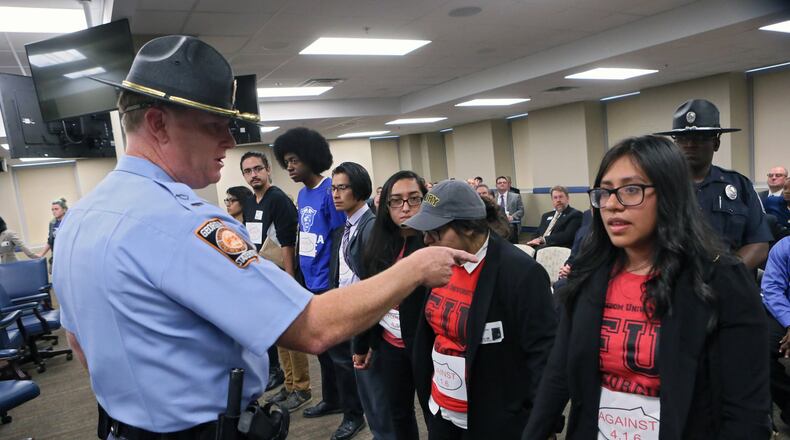Karen Ventura wondered whether she was having a nightmare when she learned Donald Trump had won the White House in a stunning upset.
She is one of 23,000 young immigrants in Georgia who are shielded by an Obama administration program for those who were brought to the U.S. without authorization when they were children. Now Ventura worries she’ll be deported.
Trump's victory Tuesday has sent shock waves through immigrant communities. The New York real estate mogul won partly on the strength of his vow to crack down on illegal immigration. And one of his promises calls for cancelling the Obama administration program that has granted temporary deportation deferrals and work permits to those like Ventura and more than 700,000 other young immigrants across the country.
The Atlanta area resident was required to submit to the government her fingerprints, address, relatives’ names and other personal information as part of the Deferred Action for Childhood Arrivals process, or DACA. Now she fears that same information will be used to send her back to her native El Salvador.
“We will be the first ones to be deported,” said Ventura, who is attending Atlanta-based Freedom University, a tuition-free school that helps prepare immigrants without legal status for college. “We are kind of trapped in a way.”
Trump has also proposed building a new wall on the southwest border, ramping up deportations and stripping automatic birthright citizenship from the U.S.-born children of immigrants who entered the country without permission. Despite those proposals and his contentious rhetoric — he has called unauthorized Mexican immigrants rapists and drug dealers — the Republican won 29 percent of the Hispanic vote to Democratic nominee Hillary Clinton's 65 percent Tuesday, according to Edison Research exit polling. That was better than Republican Mitt Romney in 2012, who picked up only 27 percent of the Hispanic vote to President Barack Obama's 71 percent.
Judith Allen, an Atlanta finance executive who was born in Mexico City to Mexican and American parents, is one of those Trump backers. She supports his plans to secure the southwest border, scrap the DACA program and deport those with criminal records. Referring to relatives who have spent considerable time and money legally immigrating to the U.S., she said fairness is an important issue for her.
“Most of my entire Mexican family has actually moved to the U.S. and they have all done it through a legal route,” said Allen, who is part of the Latinos/Hispanics for Donald Trump Facebook group. “Fundamentally, I really agree with Trump’s immigration reform policies.”
Ileana Garcia, the founder of Latinas for Trump, highlighted how the federal government has repeatedly failed to overhaul the immigration system and said Trump’s comments about Mexicans were misconstrued. She said she met Trump this year and found him to be a compassionate businessman with a diverse workforce. She added she doesn’t agree with deporting all of the estimated 11 million immigrants living without legal status in the U.S., saying some should be allowed to stay.
“If the same people who supported him – like me – get in front of him and say, ‘Let’s look into DACA so that innocent children and innocent people don’t get lost in the progress’ and if we continue to be a democracy, I think that anything is possible,” said Garcia, who works in the radio and television industry. “And I wholeheartedly believe he will be a president for the immigrants.”
Still, Trump’s election is causing anxiety among Atlanta area immigrants. Carolina Antonini, who works out of a busy immigration law office in Atlanta, said she has received dozens of phone calls from panicky clients since Election Day, including some who have been approved for DACA and others who are applying for it.
“Everybody, of course, wants to know what will happen,” said Antonini, who teaches immigration law at Georgia State University. “And, of course, the answer is: ‘I don’t know.’ I hope the answer is a humane answer.”
“There should be some amount of guilt or uneasiness for any of us – any nonprofits, any for-profits, any private firms, any uncles or aunts – who helped these young people do this,” she said about those who have helped people apply for DACA. “This is what I tell them: You have played fair. You have done the right thing. You have used the programs that were set up for you… I have to believe we are a country of humane law.”
On Wednesday, Ventura was worrying about what Trump's presidency would mean for her future. But she didn't let her fears stop her from participating in a demonstration against Georgia policies that bar immigrants without legal status from attending five of the state's top universities and paying in-state tuition at its others. Hand in hand, she and more than two dozen other protesters peacefully encircled the Georgia Board of Regents during its business meeting and prayed before disbanding under the watchful eye of uniformed police officers.
After they filed out of the board’s downtown Atlanta office building, several of the protesters became overcome with emotion. Miriam — who asked that her last name not be published to protect her husband and other relatives who lack legal status — sobbed.
“I’m scared,” said the Clayton County resident, a U.S.-born daughter of Mexican immigrants who have become naturalized U.S. citizens. She added later that she was shocked Trump had won: “We didn’t think this man would make it past the primaries. We didn’t think he would become the Republican nominee. I don’t want to say he is our president, but he is the president.”
About the Author
Keep Reading
The Latest
Featured


